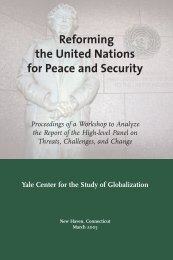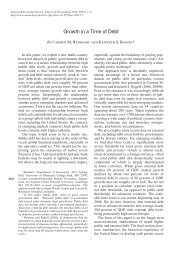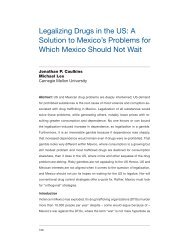The collapse of global trade, murky protectionism, and the crisis:
The collapse of global trade, murky protectionism, and the crisis:
The collapse of global trade, murky protectionism, and the crisis:
You also want an ePaper? Increase the reach of your titles
YUMPU automatically turns print PDFs into web optimized ePapers that Google loves.
VOX<br />
Research-based policy analysis <strong>and</strong> commentary from leading economists<br />
achieving practical <strong>trade</strong> facilitation reform has become a key development issue in<br />
recent years. This has been reflected in <strong>the</strong> decision to overhaul <strong>and</strong> modernize <strong>the</strong><br />
now over 50 year old WTO <strong>trade</strong> facilitation rules as part <strong>of</strong> <strong>the</strong> Doha round. What<br />
follows is a brief account <strong>of</strong> where those negotiations st<strong>and</strong> <strong>and</strong> how <strong>the</strong>y could provide<br />
a springboard for a G20-facilitated effort to cut red tape during this <strong>global</strong> economic<br />
downturn.<br />
<strong>The</strong> WTO <strong>trade</strong> facilitation negotiations: state <strong>of</strong> play<br />
Since <strong>the</strong> negotiations began, WTO members have submitted proposals for new rules<br />
on <strong>the</strong> freedom <strong>of</strong> transit <strong>of</strong> goods, <strong>the</strong> fees <strong>and</strong> formalities faced by <strong>trade</strong>rs, <strong>and</strong> <strong>the</strong><br />
publication <strong>and</strong> administration <strong>of</strong> <strong>trade</strong> regulations <strong>and</strong> customs rules, respectively<br />
Articles V, VIII <strong>and</strong> X <strong>of</strong> <strong>the</strong> GATT agreement. <strong>The</strong> proposals cover measures that are<br />
considered relatively easy to implement (such as publishing rules <strong>and</strong> regulations on<br />
<strong>the</strong> internet) to potentially far more complex <strong>and</strong> resource intensive ones (such as <strong>the</strong><br />
implementation <strong>of</strong> electronic single window regimes). Moreover, <strong>and</strong> perhaps reflecting<br />
a growing consensus on <strong>the</strong> benefits to be obtained from a positive <strong>and</strong> ambitious<br />
outcome, negotiations have been conducted in a spirit <strong>of</strong> cooperation <strong>and</strong> compromise<br />
frequently not evident in o<strong>the</strong>r areas <strong>of</strong> negotiation.<br />
Whatever commentators might think about progress, or lack <strong>of</strong> it, in <strong>the</strong> overall<br />
Doha Round, <strong>the</strong> <strong>trade</strong> facilitation negotiations have made significant progress <strong>and</strong><br />
<strong>the</strong> prospects for securing agreement on a practical range <strong>of</strong> new disciplines appear to<br />
be good. Indeed, in several cases industrialized <strong>and</strong> developing countries have submitted<br />
joint proposals. Trade facilitation is <strong>the</strong>refore not an issue that splits countries<br />
strictly across levels <strong>of</strong> development, which is important to bear in mind when considering<br />
<strong>the</strong> role <strong>of</strong> <strong>the</strong> G20 whose members are drawn from <strong>the</strong> industrialized <strong>and</strong><br />
developing worlds.<br />
<strong>The</strong> key to concluding negotiations on <strong>the</strong> content <strong>of</strong> a new accord on <strong>trade</strong> facilitation<br />
will, however, depend in large part on dealing effectively with <strong>the</strong> remaining<br />
concerns <strong>of</strong> developing <strong>and</strong> Least Developed Country (LDC) members about <strong>the</strong><br />
potentially high costs <strong>and</strong> difficulties <strong>the</strong>y will likely face during implementation.<br />
Essentially, developing countries recognize <strong>the</strong> <strong>trade</strong> enhancing benefits <strong>of</strong> implementing<br />
<strong>the</strong> measures under negotiation but want some form <strong>of</strong> guarantee that <strong>the</strong><br />
necessary technical assistance <strong>and</strong> capacity building support will ultimately be made<br />
available as <strong>and</strong> when it is needed.<br />
Dealing successfully with <strong>the</strong> concerns <strong>of</strong> developing countries presents some real<br />
challenges. While <strong>the</strong> development community is already providing significant <strong>and</strong><br />
growing levels <strong>of</strong> support for <strong>trade</strong> facilitation reform, <strong>the</strong>y are cautious about specifically<br />
linking such support to hard commitments in a new WTO agreement. Many<br />
donors have worked hard to develop practical mechanisms for client engagement <strong>and</strong><br />
dialogue, in keeping with <strong>the</strong> Paris Declaration principles, <strong>and</strong> would be reluctant to<br />
see <strong>the</strong>se modalities ab<strong>and</strong>oned in favour <strong>of</strong> expedient but less sustainable <strong>and</strong> effective<br />
mechanisms simply in order to secure agreement. In addition, many donors<br />
already have extensive <strong>trade</strong> facilitation programs <strong>and</strong> do not want <strong>the</strong> ra<strong>the</strong>r narrow,<br />
yet significant, WTO agenda crowding out <strong>the</strong> sort <strong>of</strong> deep <strong>and</strong> comprehensive<br />
reform initiatives that are typically financed through existing bilateral <strong>and</strong> multilateral<br />
channels.<br />
<strong>The</strong> issue <strong>the</strong>refore is not whe<strong>the</strong>r finance for implementation <strong>of</strong> <strong>trade</strong> facilitation<br />
related reforms would be made available, but whe<strong>the</strong>r negotiators can agree on appro-<br />
100





